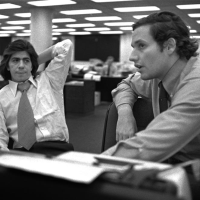Journalists Less Likely to Take Risks Getting Around Walls Built to Keep Them Out
 Intrepid Washington Post investigative reporters Carl Bernstein and Bob Woodward, 1974 (AP photo)
Intrepid Washington Post investigative reporters Carl Bernstein and Bob Woodward, 1974 (AP photo)
An overwhelming majority of journalists in the United States say it’s vital to investigate government misdeeds. But a much smaller percentage of them are willing to take risks to carry out such investigations, according to a new media survey.
Nearly four out of five journalists—78%— believe it is “extremely important” to do investigative reporting when it comes to public officials or agencies, based on responses in the report, “The American Journalist in the Digital Age” published by Indiana University’s School of Journalism.
The response was higher than it was 10 years ago (71%) and 20 years ago (67%). But there has been a steep decline in the number of reporters willing to use classified or confidential information given to them without authorization for their stories.
In 1992, more than 80% of journalists were OK with using leaked business or government documents to report a story, and in 2002, 78% were fine with it. But now, only 58% would make use of such documents.
The results were more remarkable, given that the survey was conducted last year from August to December, when numerous stories were being produced about the National Security Agency’s domestic and international spying, most of which were made possible by whistleblower Edward Snowden.
The Guardian and The Washington Post, which took the lead in revealing NSA secrets using Snowden’s leaks, were rewarded for their work and won Pulitzer Prizes.
The report also found that journalists are less likely to approve of the use of hidden microphones or lies about their identity to carry out investigations.
So why have journalists become more risk adverse?
Eric Levenson at The Wire notes several factors, “including the post-9/11 surveillance state and the rise of WikiLeaks, which is often credited (or accused?) with taking the responsibility for those documents out of the hands of journalists.”
There’s also the Obama administration’s “unprecedented targeting of whistleblowers, too,” which “likely has played a role in turning opinions against the use of secret documents. That lack of approval may have played a role in the many media hit pieces on Glenn Greenwald [the former Guardian reporter who worked with Snowden], for one,” Levenson adds.
Other things that could have an effect on aggressive journalism are the increasing corporatization of the media and shrinking newsrooms. Editors answering to out-of-state bosses can be reluctant to give the go-ahead to more risky news-gathering tactics. And reporters who are now doing the work that used to be done by many more people often don’t have the time to conduct in-depth investigations.
-Noel Brinkerhoff, Steve Straehley
To Learn More:
Journalists Aren't the Big Fans of Leaks that They Used to Be (by Eric Levenson, The Wire)
As Government Officials Continue To Shed Trustworthiness, Journalists Continue Placing More Trust In Government Officials (by Tim Cushing, TechDirt)
The American Journalist in the Digital Age: Key Findings (by Lars Willnat and David H. Weaver, School of Journalism, Indiana University) (pdf)
U.S. Lost 30% of its Paid Journalists in 6 Years (by Noel Brinkerhoff, AllGov)
Obama’s War on Leaks Found to be the “Most Aggressive since Nixon” (by Noel Brinkerhoff, AllGov)
- Top Stories
- Unusual News
- Where is the Money Going?
- Controversies
- U.S. and the World
- Appointments and Resignations
- Latest News
- What If China Invaded the United States?
- Donald Trump Has a Mental Health Problem and It Has a Name
- Trump Goes on Renaming Frenzy
- Trump Deports JD Vance and His Wife
- Trump Offers to Return Alaska to Russia






Comments